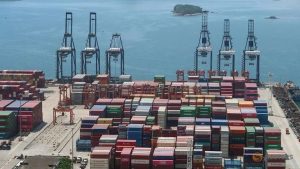
FILE PHOTO: Cranes and containers are seen at the Yantian port in Shenzhen, following the novel coronavirus disease (COVID-19) outbreak, Guangdong province, China May 17, 2020.
BEIJING: The slump in China’s exports likely eased in June as some countries reopened their economies, while imports contracted less sharply on higher crude oil and commodities purchases, a Reuters poll showed on Monday (Jul 13).
June exports from the world’s second-largest economy are expected to have contracted 1.5 per cent from a year earlier, according to a median estimate from the survey of 32 economists, easing from a decline of 3.3 per cent in May.
Imports likely fell 10.0 per cent on year, the poll showed, compared with a steep drop of 16.7 per cent the previous month, due to higher purchases of crude oil and orders for infrastructure materials.
Official and private factory surveys for June have shown the manufacturing sector recovery gathering more momentum.
Factories have ramped up production on an expansion in new orders, fuelling expectations of an economic rebound faster than analysts previously forecasted. Factory-gate prices, for example, turned positive on a monthly basis last month.
Since mid-May, European countries and the United States have gradually eased their lockdowns, leading to increased shipments of some cargo backlogs previously stuck at Chinese ports and driving a relatively fast rebound in port throughput, said China Ports & Harbours Association in June.
In the last 10 days of June, container throughput at major Chinese ports rose 4.3 per cent from the same period a year earlier, latest data from the association showed.
Moreover, the recurrent waves of coronavirus cases in major economies overseas, especially in the United States since mid-June, may have continued to support China’s exports of personal protective equipment (PPE) in June, analysts at Nomura said in a note.
China’s export performance has not been as severely affected by the global slowdown as some analysts had feared, but weak overseas orders are set to weigh on its manufacturers in the coming quarters.
Chinese officials have repeatedly vowed to stabilize foreign trade, a sector that provides about 200 million urban jobs, and help as many firms to survive the downturn. One of the ways they have advocated is for manufacturers to sell to domestic markets but a lack of sales channels and price-cutting have hindered their efforts. The domestic recovery is also being restrained worries about a second wave of infections.
The coronavirus pandemic is causing wider and deeper damage to economic activity than first thought, the International Monetary Fund said in June, prompting the institution to slash its 2020 global output forecasts to -4.9 per cent from a contraction of 3.0 per cent predicted in April.

